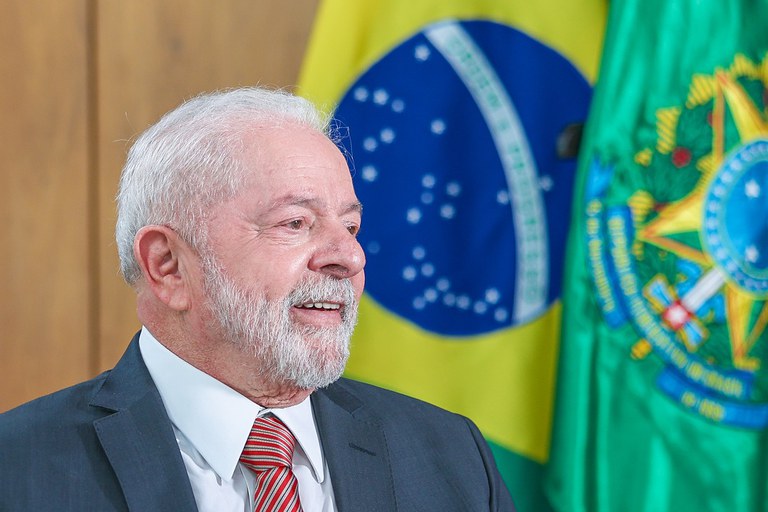Advanced cookie settings
To improve your experience on the platform and provide personalized services, we use cookies.
Notícias
EXTERNAL RELATIONS

- Credit: PR/Ricardo Stuckert
President Luiz Inácio Lula da Silva will arrive in China on Wednesday (12) for one of this term’s most important state visits. Lula will travel alongside a delegation of businesspersons, state governors, congressmen and ministers. The program will include official visits, bilateral meetings and the signing of various agreements.
The Brazilian government’s goal is to relaunch its relations with the country that has been its main trading partner since 2009. In 2022, China imported over USD 89.7 billion in Brazilian products, especially soy and ores, and exported almost USD 60.7 billion to Brazil. Trade between the two countries – USD 150.4 billion – has increased 21 times since Lula’s first visit to China in 2004.
Despite Lula’s original March visit having been postponed due to health issues, the part of the delegation that traveled to China beforehand achieved important results, especially concerning agriculture and livestock – such as the end of China’s embargo on Brazilian beef. The embargo was lifted in record time, after only 29 days.
Brazil’s Minister of Agriculture and Livestock, Carlos Fávaro – who flew to Beijing ahead of the presidential delegation –, carried out part of the initially scheduled program, and presented results to President Lula in a meeting on April 4. According to Fávaro, Chinese authorities were receptive and the presidential delegation’s visit may further facilitate new agreements.
"Important negotiations which we’ve long dreamed of ought to come true with President Lula’s visit to China", said the minister. One of these negotiations is digital certification, which promises to make product processing speedier and more reliable, thus reducing bureaucracy for Brazilian exporters. The agreement that provides for direct operation between the Brazilian real and the Chinese yuan – with no in-between dollarization – may also facilitate trade between the two countries.
The program also includes important topics such as tourism and investments. Moreover, Brazilian programs for combating hunger, for protecting the environment and for sustainable development may once again be seen as a reference by the Chinese government.
Around 20 bilateral agreements are expected to be signed during the visit. One of them is for construction of CBERS-6, the sixth in a line of satellites that have been built by Brazil and China together. The new model presents improved technology that allows for efficient monitoring of biomes such as the Amazon Rainforest even on cloudy days.
In China, president Lula will travel with an official delegation which includes ministers Fernando Haddad (Finance), Marina Silva (Environment and Climate Change), Carlos Fávaro (Agriculture and Livestock), Luciana Santos (Science, Technology and Innovation), Mauro Vieira (Foreign Affairs), Alexandre Silveira (Mines and Energy), Paulo Teixeira (Agrarian Development), Wellington Dias (Social Development) and Juscelino Filho (Communications).
The Brazilian official delegation will also include State governors Jerônimo Rodrigues (Bahia), Elmano de Freitas (Ceará), Carlos Brandão (Maranhão), Helder Barbalho (Pará) and Fátima Bezerra (Rio Grande do Norte).
APPOINTMENT SCHEDULE — According to the new schedule, the visit of the Brazilian delegation to China begins next Thursday (13) in Shanghai. In the morning, President Lula will participate in former Brazilian President Dilma Rousseff’s inauguration as head of BRICS’ (a bloc formed by Brazil, Russia, India, China and South Africa) New Development Bank. Later that day, Lula will meet with businesspersons and then travel on to Beijing.
On Friday (14), the official agenda in the Chinese capital includes a morning meeting with the President of the National People's Congress, Zhao Leji, at the Great Hall of the People. Next, Lula will ceremoniously lay flowers in Tiananmen Square.
Later that day, the president will meet with union leaders and then return to the Great Hall of the People, where he’ll meet with the Prime Minister of China, Li Qiang, and afterwards take part in an official ceremony prepared for his arrival with President Xi Jinping. The schedule includes an open meeting, a ceremony for the signing of bilateral agreements, and a closed bilateral meeting. After that there will be a gift exchange ceremony, official photos, and an official dinner.
Before returning to Brazil, the presidential delegation will land next Saturday (15) in the United Arab Emirates capital Abu Dhabi for an official visit.
RELAUNCHING BILATERAL RELATIONS — Lula’s visit to China is part of the new Brazilian government's efforts towards reestablishing international relations, which also include recent trips to Argentina – where the Celac meeting took place –, Uruguay and the US, as well as meetings with European leaders who came to the president’s inauguration in January. This is also Lula’s first trip outside the Western Hemisphere during this third term in office.
This is also the president’s third official visit to China. The relationship between the two countries has become much closer – and the trade balance has increased in a continuous and sustained way – since 2004, when President Lula first visited Beijing. He first visited China in 2009.
BUSINESS PARTNERS — 2023 is the 50th anniversary of the first trade relations between Brazil and China. In fact, the first trade between the two countries took place in 1973, a year before the establishment of official Sino-Brazilian diplomatic relations.
In 2022, Brazil’s best-selling product to the Chinese was soy – 36% of total exports –, followed by iron ore (20%) and oil (18%). The exportation profile changed slightly in January and February 2023, with oil leading at 23%, followed by soy (22%) and iron ore (21%).
Trade with China was leveraged during President Lula's first two terms in office. In 2003, his first year as president, exports to China were only USD 4.5 billion, and imports, USD 2.1 billion – resulting in a USD 6.6 billion balance.
In the last year of his second term, in 2010, exports had increased 582%, to USD 30.7 billion; and imports rose to USD 25.6 billion (an 1,100% increase), for a commercial volume of USD 56,3 billion (a 753% increase).
